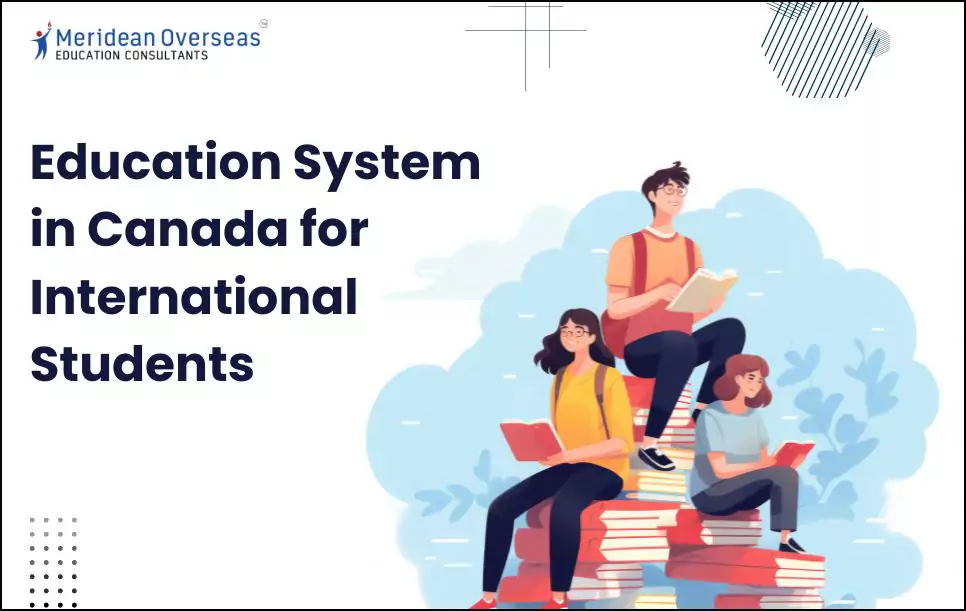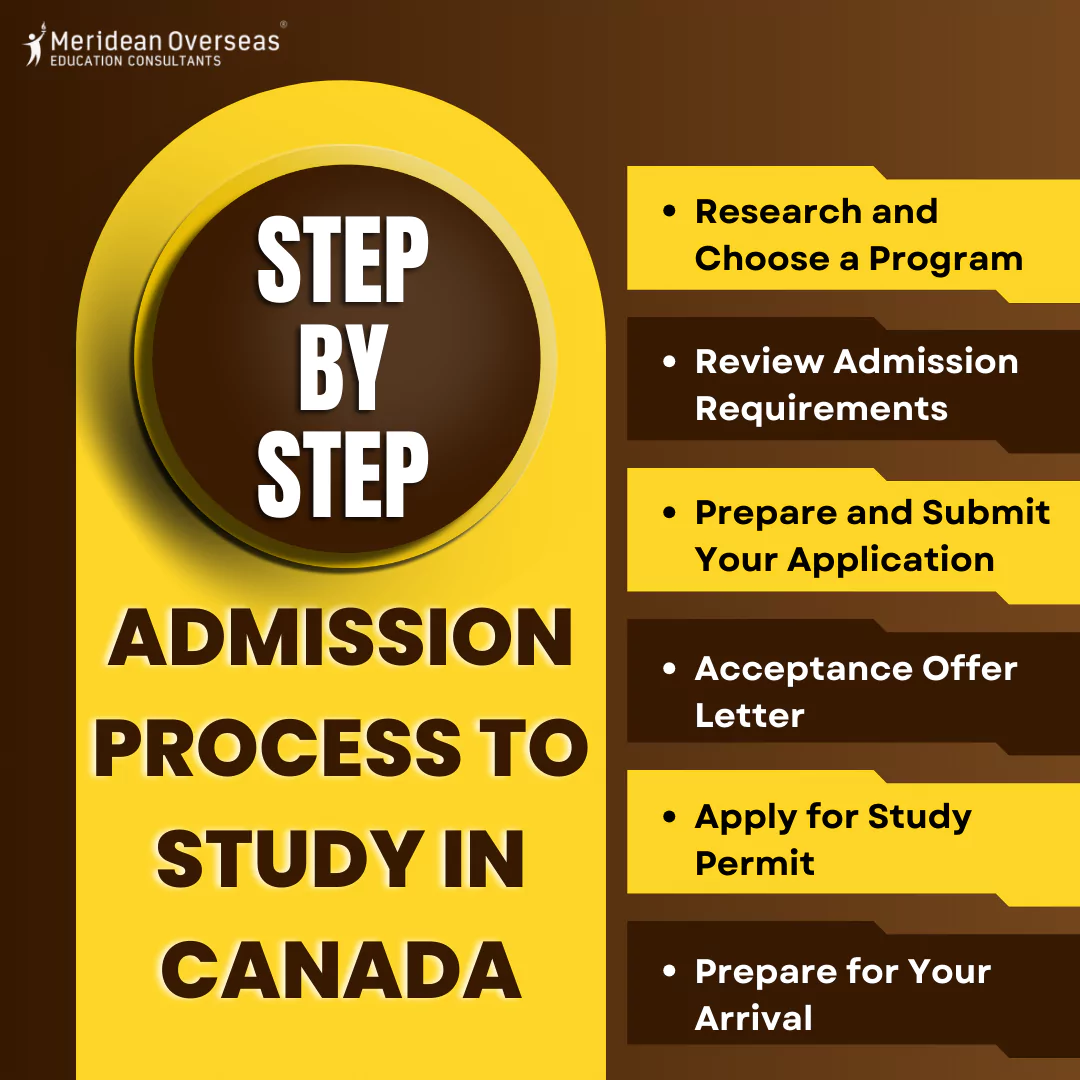
Announcements

Announcements

Meridean Overseas
Updated On 20 September 2024 & Read Time 8 minutes
6.1k
Canada is one of the most preferred study-abroad destinations, and thousands of international students come to the country every year. The reasons are diverse educational options, a vibrant environment, and affordable education.

From the number of globally recognized universities and vibrant campus life to cultural diversity and immigration opportunities, several factors make Canada the most attractive place for international students.
In this regard, the blog encompasses details of Canada education system, highlighting what students can expect while pursuing studies over here. So, let’s get started!
Table of Contents
The education system in Canada is widely renowned for providing affordable education. Provincial governments manage all the systems. Different levels of study and educational stages can vary across diverse clusters.
Each level is designed to provide students with a comprehensive education and prepare them for future academic or professional endeavors. The table below provides detailed information on each level.
|
Qualification |
Duration |
|
Certificates and Diplomas |
1-2 years |
|
Associate Degree |
2 years |
|
Bachelor’s degree |
3-4 years |
|
Post-graduate diploma |
1-2 years |
|
Master’s degree |
1-2 years |
|
PhD or Doctorate |
4-7 years |
|
Post-doctoral program |
No time limit |
Now that you have a basic knowledge of the education system in Canada, you must be thinking why an Indian student should understand this and why one should study there. The country has become a popular study overseas destination for international students for a myriad of reasons, explaining why canada:
Superior Quality Education: The universities and colleges in Canada consistently rank among the best in the world. Such institutions include the University of Toronto, the University of British Columbia, and McGill University.
Variety of Programs: The universities in Canada offer a wide variety of programs, from arts and humanities to engineering and business. This ensures that students find a program that matches their interests and career goals.
Safe and Inclusive Environment: Canada is known for its safety, welcoming culture, and multicultural society. International students often find adjusting and feeling at home in the host country easier.
Ample Work Opportunities: Many universities and colleges in Canada offer work-study programs and co-op placements, providing students with valuable work experience in the higher education system in canada.
Embark and excel in your study abroad journey with our expert team!

After having a good knowledge of the Canadian education system and why one should study there, you must also take a deeper look at the admission requirements to apply to universities in Canada. There are several steps to follow for the eligibility criteria, along with various documentation. Check out the steps and documentation below.

Research and Choose a Program: Indian students must start by researching the country's top universities and colleges. Following this, one should also explore courses suitable as per their area of interest. Don’t fret and always remember to research according to some factors like location, program curriculum, institutional reputation, etc.
Review Admission Requirements: Each institution has academic prerequisites, such as language proficiency, and standardised test scores. Make sure you meet these requirements before applying.
Prepare and Submit Your Application: Students must keep ready documents like academic transcripts, letters of recommendation, and proof of language proficiency. They must submit their applications through the university’s portal or a centralized application system.
Acceptance Offer Letter: When students are selected and accepted into their desired university, they will receive the offer letter, which they must review. All the instructions must be followed properly to confirm and secure their seats.
Apply for Study Permit: Students are further required to obtain a study permit to study in Canada, so they should apply for one through the Immigration, Refugees and Citizenship Canada (IRCC) website. Students must provide proof of acceptance, financial capability, and other documents.
Prepare for Your Arrival: Once students’ study permits are approved, they must arrange housing, travel, and health insurance. They must also familiarise themselves with the country’s culture and the local area they will study.
Knowing the complete process is quite important. It is crucial to note essential documents. A short list of required documentation is mentioned below.
Attested copies of mark sheets of Standard X, XII, and the Bachelor's degree (if applicable)
Minimum of 2 academic reference letters from recent tutors
Work experience letter and two letters of recommendation from the employer/manager
Statement of Purpose (SOP)
Resume
Photocopied score reports of GMAT / IELTS / TOEFL
Portfolio (in case of Students applying for art and design courses & architecture programs)
Others (certificates/achievements at the state and national level and extracurricular activities)
Proof of funds (Guaranteed Investment Certificate)
Provincial Attestation Letter (PAL)
Medical Tests
Have you set your mind to studying in Canada? Let's turn your study abroad dreams into reality today!
Register Now!The cost of studying in Canada depends completely on the university, your chosen course, and the level of degree you’re pursuing. For undergraduate courses, one tends to pay around CAD 15,000 to CAD 30,000, while for graduate courses, students must pay around CAD 20,000 to CAD 30,000.
Apart from tuition fees, university application fees are around 50-250 CAD, and the visa application fee is 235 CAD (CAD 85 for biometrics and CAD 150 for service charges). A medical examination is also required, and it costs approximately 5,000 to 6,000 INR.
Several universities and colleges in Canada offer scholarships and financial aid to international students as well as Indian students based on academic merit, financial need, or other criteria. You must research available scholarships and apply early to one of them suitable for you to increase your chances of receiving financial aid.
|
Scholarships |
Offered By |
Amount |
|
Lester B. Pearson International Scholarship Program at the University of Toronto |
University of Toronto, Canada |
The scholarship will cover tuition, books, incidental fees, and full residence support for four years. |
|
York University International Student Scholarships |
York University in Ontario |
President’s International Scholarship of Excellence: $180,000 Tentanda Via Award: $120,000 Global Leader of Tomorrow Award: $80,000 |
|
Vanier Canada Graduate Scholarships (Vanier CGS) |
Canadian Universities with Vanier CGS |
$50,000 |
|
University of Manitoba Graduate Fellowships |
University of Manitoba |
Master’s awards are valued at $28,000 Doctoral awards are valued at $72,000 |
|
Pierre Elliott Trudeau Foundation Doctoral Scholarships |
Participating Canadian Universities |
$40,000 per year |
|
Waterloo International Master’s Award of Excellence |
University of Waterloo |
$2,500 per term |
|
University of Calgary Graduate Awards |
University of Calgary |
$1,000 to $40,000 |
Need expert guidance in choosing the best course for you to study in Canada? Get free counseling from experts to study in Canada.
Talk to our CounsellorsInternational students in Canada are allowed to work part-time during the academic year and full-time during breaks. Work opportunities can help offset living expenses and provide valuable work experience.
Working part-time while studying in Canada offers Indian students valuable experience and networking opportunities. Top options include roles like writer/editor (up to CA$5/hr), barista (CA$14/hr), cook (CA$13/hr), sales assistant (CA$14/hr), and bartender/server (CA$13/hr plus tips).
Other roles include bookkeeper (CA$25/hr), dog walker (CA$15/hr), teaching assistant (CA$15-16/hr), freelancer (CA$20-40/hr), and translator (CA$14-55/hr). Minimum wages vary by region, from CA$11.75 to CA$16 per hour.
Eligibility includes having a valid study permit, enrolment in a Designated Learning Institution (DLI), maintaining good academic standing, and having a Social Insurance Number. Therefore, working part-time will help international students bear living costs and expand their horizons.
A Canada Permanent Resident Visa is a gateway to permanent resident status in Canada after completing your higher studies. The Canadian Government offers an official document allowing you to study, work, or migrate anywhere in Canada. The condition is that one needs to live 3 years, minimum out of 5 years, so an Indian student completing his/her education and working in PGWP permit is eligible for PR to Canada.
To apply for Canada PR, one must require a passport, IELTS score, proof of Canadian education/ECA, proof of funds, medical examination reports, police verification certificates, birth certificates, photographs, and other relevant documents.
Canada education system offers a rich and rewarding experience for Indian students. With its high academic standards, diverse program offerings, and welcoming environment, Canada provides an ideal setting for students to pursue their educational and career goals.
Understanding the application process, preparing for student life, and exploring scholarships can help international students make the most of their time in Canada and enjoy a transformative educational journey.
We hope you learned about the best education system for international students in Canada. However, if you have doubts, contact our expert counsellors at Meridean Overseas Education Consultants (MOEC). You can also take free online counselling through our website. Our expert counsellors will provide you with the best support and guidance you need for admission and visa. In addition, they will help you shortlist the universities according to your profile. For more information or any queries, contact application02@meridean.org or 1800-1230-00011.

Contact MOEC Experts for Study Abroad Guidance!
By using our site, you agree to our use of cookies.

Hurry up before admissions close.

